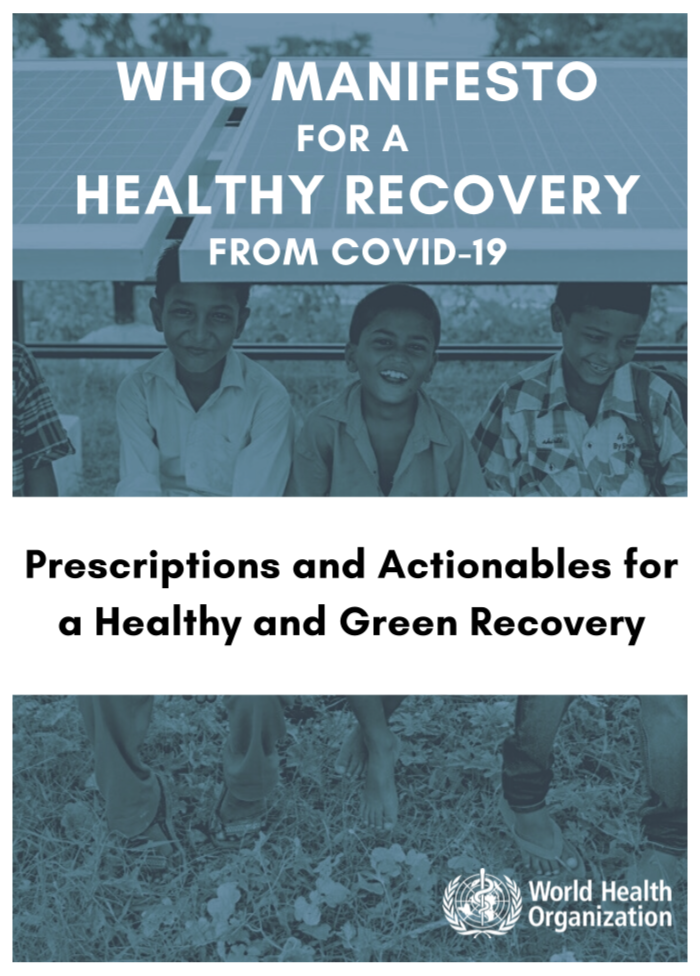SI’s Advisor to Advocacy, Linda Witong, introduces the World Health Organisation’s Manifesto for a Healthy and Green COVID-19 Recovery.
“On May 18, 2020, the World Health Organisation (WHO) released its “Manifesto for a Healthy and Green COVID-19 Recovery.” WHO ‘s manifesto made it clear that the COVID-19 pandemic was far more than a health crisis: it was affecting societies and economies at their core and had served as a reminder of the intimate and delicate relationship between people and planet. At present, this relationship is in dire straits. The world is reeling from the effects of a COVID-19 pandemic which has already resulted in 14,765,256 confirmed cases and claimed 612,054 lives. Months of stay-at-home orders and business closures have put millions of people out of work, upending the livelihoods and even survival of working families. The economic crisis which this pandemic has created has also already, by many measures, exceeded the worst Great Recession and exacerbated economic, social, cultural and health inequalities that existed before the pandemic, particularly for women and people of colour.

Click the image to access the prescriptions and Actionables of the WHO Manifesto for a Healthy and Green Recovery from COVID-19.
According to the WHO Manifesto, any efforts to make our world safer in the future are doomed to fail unless we address the critical interface between people and pathogens as well as the existential threat of climate change that is making our Earth less habitable. Moreover, going forward no longer means following the business as usual model as “going back to “normal” is no longer good enough”.[1]
In order to strengthen the international and national surveillance and response systems so that they will be strong or fast enough to completely halt future transmission of viruses, States will have to provide reliable and affordable access to universal health coverage including equal access to any necessary medical treatment. States must also eliminate any socioeconomic, cultural and gender inequalities which expose vulnerable groups including women and minorities to a greater risk of losing their livelihoods or being exposed to future viruses such as COVID-19. Moreover, there cannot be any implementation of austerity measures when addressing environmental protection, emergency preparedness, health systems, and social safety nets as any “savings” will be far outweighed by the costs incurred to fight future pandemics or the climate crisis.
WHO’s Manifesto recommended 6 “prescriptions” in order to achieve a green and healthy recovery from COVID 19. States were to:
1. Protect and preserve the source of human health: Nature;
2. Invest in essential services, from water and sanitation, to clean energy in healthcare facilities. This included providing occupational protection for health workers as well as eliminating avoidable environmental and occupational risks within the work place;
3. Ensure a quick and healthy energy transition;
4. Promote healthy, sustainable food systems which included the transition to healthy, nutritious and sustainable diets in place of unhealthy, high-calorie diets;
5. Build healthy, pollution free and livable cities E.g. use public transportation or bicycles rather than cars;
6. Stop using taxpayers money to fund pollution E.g. end fossil fuel subsidies.
The WHO Manifesto also observed that, in most countries, Finance Ministries would take the lead in defining COVID-19 economic recovery packages. Given the integral connection between the environment, health and the economy, WHO’s Manifesto also observed that it was important that health leaders, such as Chief Medical Officers, be directly involved in their design, report on the short- and long-term public health repercussions that they may have, and give their stamp of approval.
In addition, achieving any goal of protecting lives, livelihoods and the environment were also contingent on receiving the support of the people including health workers, youth, women, minorities, indigenous people and other vulnerable groups.
Finally, these goals were not seen by WHO as being impossible to meet as the COVID-19 crisis had shown that even difficult policies could be supported if any decision making was transparent, evidence-based, and inclusive, and had the clear aim of protecting people’s health, their families and their livelihoods – rather than serving special interests.”
[1] WHO Director-General Dr Tedros Adhanom Ghebreyesus. Address to the 73rd World Health Assembly. May 18th 2020.

